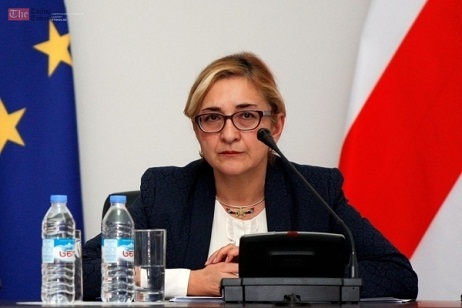Tbilisi asks for EU’s stance on Georgia's visa liberalisation

Georgia’s Foreign Minister Tamar Beruchashvili has called on European Union (EU) leaders to distinctly express their readiness for the Eastern Partnership (EaP) states’ European future at next week's EaP Summit in Riga, Latvia.
The Georgian Foreign Minister issued a statement where she wrote about the importance of the upcoming EaP Summit for Georgia and five other EaP countries.
About 15 leading media outlets from EU member states published Beruchashvili's op-ed, in which the Georgia official urged the EU to stay committed to Georgia’s visa liberalisation.
"When the leaders of 34 countries meet on 21-22 May for the Riga Eastern Partnership Summit, we will be confronting geopolitical realities which are dramatically different from those which framed our last gathering,” Beruchashvili wrote.
"Already in Vilnius in November 2013, the Russian Federation posed a serious challenge to basic principles of international law and praxis, including the sovereign right of nations to decide their own future. But since then, Moscow has gone much further in its aggressive attempts to tear down the very fundamentals of the European security architecture.”
The Georgia Minister said the Summit would be just as "critical" for the EU as it was for it's partner countries including Georgia.
"We must make sure it delivers a strong message of joint commitment to the European future of our region, and backs this up with concrete measures to realise this vision,” Beruchahsvili believed.
She also highlighted the importance of visa liberalisation for Georgia and said: "The progress towards visa liberalisation for Georgia will be an important part of the picture”.
"Those who doubt the value and success of the Eastern Partnership Initiative have only to look at Georgia to stand corrected,” she said.
"While we benefit from the overwhelming consensus in our country in favour of democratic reforms and European integration, the Eastern Partnership Initiative has provided the concrete framework for the realisation of this vision, not least through the Association Agreement and Deep and Comprehensive Free Trade Agreement signed last June”.
Beruchashvili noted that over the last two and a half years alone, Georgia had, with the support of its EU partners, had made "great strides” in bringing Georgia into line with the highest European and international standards.
"Today, we are proud to be recognised as a regional leader in terms of democracy and human rights, a stable and secure investment destination in a key strategic location and a pro-active contributor to European and international security,” she said.
The address also read that the benefits accrued to both Georgia and the EU thanks to "this all-encompassing transformation are substantial”.
"But our region still has a long way to go to reach the state of peace, stability, democracy and prosperity to which we all aspire,” her statement read.
The Georgian Foreign Minister noted her country was well aware of the challenges, both internal and external, that were ahead.
"We are fully committed to maintaining the momentum of reforms. We trust in turn that the EU will continue its support for Georgia’s European path, matching reforms with increased integration based on defined, transparent criteria,” Beruchashvili said.
She added an immediate critical element of this equation would be the EU’s stance at Riga on visa liberalisation for Georgia.
"We have put immense efforts into fulfilling all the benchmarks for visa free travel ... to demonstrate to our people that the commitment to comprehensive reforms delivers tangible benefits. When the technical requirements are completed, it is our clear hope that visa free travel to the EU will be granted for Georgian citizens,” Beruchashvili said.
She added: "Removing visa requirements for Georgian citizens will mean more tourism, cultural and student exchanges, and civil society partnerships. This will help develop Georgia and anchor the next generations firmly within the European family of nations."
"Most importantly, it will provide a clear demonstration to the people of Georgia, including in the occupied territories of Abkhazia and South Ossetia, and to those of the other Eastern Partnership countries, that the EU upholds a merit-based approach and delivers on its promises."
"For Georgians, visa liberalisation will provide a long-awaited tangible reward for reforms and encourage renewed efforts. For the people of the occupied regions, it will be a symbol of what stands to be gained from reintegration with the Georgian state. For other Eastern Partnership countries, it will offer a clear incentive for reforms”.
The Georgian Foreign Minister believed in today’s "difficult context”, the shared vision and values of the Eastern Partnership were "more important than ever”.
"If these are to flourish, we must demonstrate at Riga that they can and do translate into tangible benefits for the people of the region,” Beruchashvili wrote.
 Tweet
Tweet  Share
Share